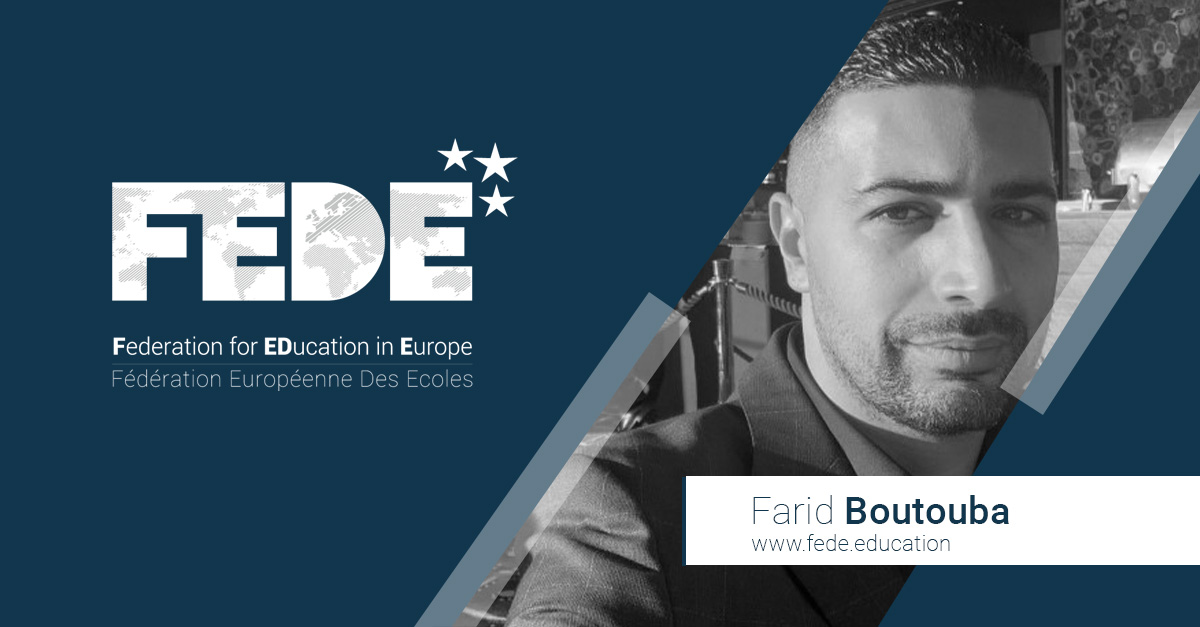Graduated from ESTC, Farid Boutouba explains us why he wanted to add the FEDE degree in human resources to his previous studies and how the key skills he developed through the programme enabled him to deeply understand the central role of the HR manager in a company.
Can you tell us what you studied and a little about your career so far?
In 2003 I obtained a BTS in Business Unit Management via sandwich training at the Carrefour Marseille Grand Littoral supermarket. For eight years I worked as a product and services vendor. In 2013 I became intern manager for multimedia sales on the same site.
I managed 10 people and a dashboard covering €8 million of turnover.
From 2015 to 2020 I was transferred to Carrefour Beaucaire and became head of sector. I was responsible for 20 members of staff in the non-food section and was in charge of developing the Drive service and organic section.
I now hope to join the Carrefour Franchise and become a company manager and owner of my own business assets.
But to do this I needed a degree in human resources – that was one of the conditions for being accepted into the scheme.
The FEDE programme is a strong addition to my previous studies. I’ve acquired the key skills needed to manage a company and learnt about the rights and obligations of my future colleagues.
What is your current situation?
On obtaining the degree I applied to the Carrefour franchise scheme. My application is currently being considered by management
at the Carrefour South-East headquarters. So I’m currently a professional specialised in human resources management.
I mostly work in the supermarket sector.
Why did you choose the ESTC to study for your FEDE degree?
I chose to study for my FEDE degree at the ESTC because in 2018 I submitted a ‘validation of previous experience’ application there.
One of the programme managers, Ms Ouazzini, explained that my professional skills could be transferred into academic credits and that my experience could be translated into a level-7 professional qualification in commercial development management.
I really liked the close contact with the teaching team and the personalised supervision on offer at the ESTC, so it was obvious to me that I should do my master’s in human resources there.
The teachers at the ESTC really push their students. They encourage them to develop their ideas fully and have them take part actively in class so as to encourage discussion.
The case studies and professional role-plays provided by our teachers really add to the quality of the course.
My professional thesis was supervised by Ms Mallazon, who did a great job and offered me plenty of guidance. The institution is managed by Mr Taxil and Mr Portal. He and the teaching team are brilliant: always on hand to answer your questions and provide explanations.
During the pandemic, the stress amongst the students was palpable. When the government announced a lockdown, the ESTC quickly (the next day) sent us an explanatory email that was very reassuring. We were given a very clear new guidelines for studying. We were able to continue ordinary lessons using Teams Microsoft. Distance learning meant we were all able to continue our studies.
How has your FEDE degree advanced your career?
The FEDE degree in Human Resources is really thorough and covers a range of really interesting subjects such as employment law, HR strategy and conflict management in the workplace.
The subjects we studied, which combine theory and practice, are really useful in the workplace.
The degree helped me better to understand the essential role of human resources managers in companies and to develop my knowledge of theoretical aspects, which are essential if you want to comply with legislation and increase your professional legitimacy.
What is your fondest memory of your time at the ESTC?
At the beginning of the year, the course administrators and a group of students organised a skiing weekend designed to bring together as many students as possible. The trip was forgettable. It really helped to gel us together as group, and we made lots of friends during our short stay.
The trip helped me better to understand my identity as a student – which wasn’t necessarily easy since I was older than all the others.
What would be your advice to the ESTC’s current students?
I’d advise them to work hard throughout the programme. The programme covers a large range of skills, focussing on skills that are essential if you want to access senior management positions.

